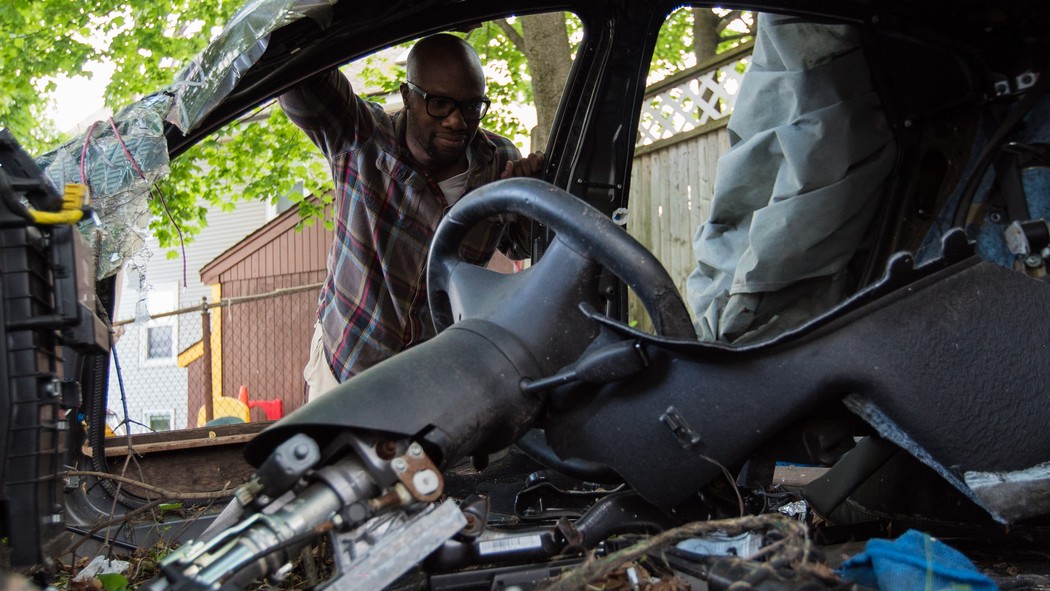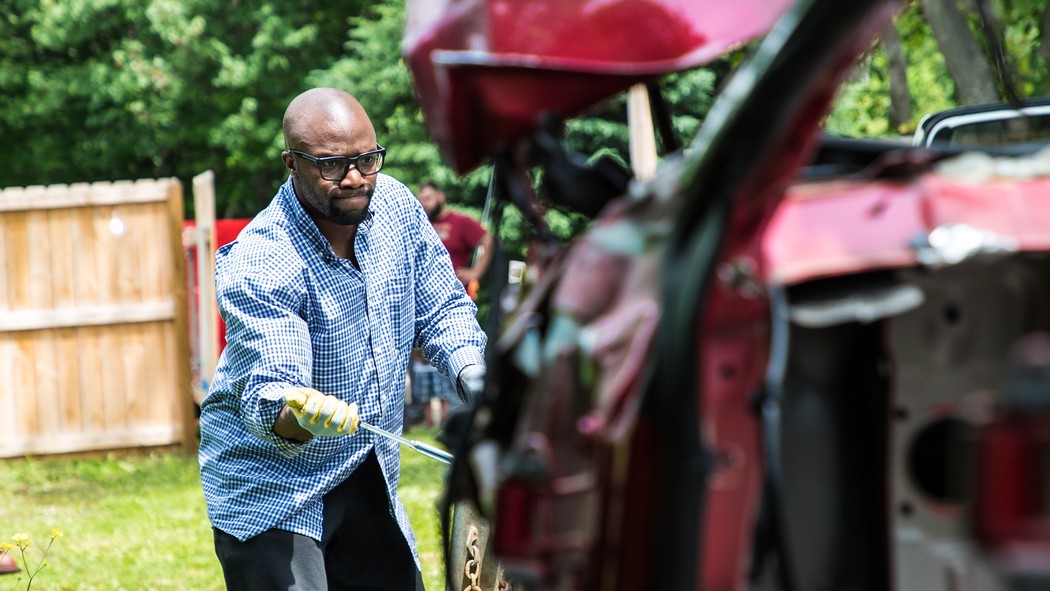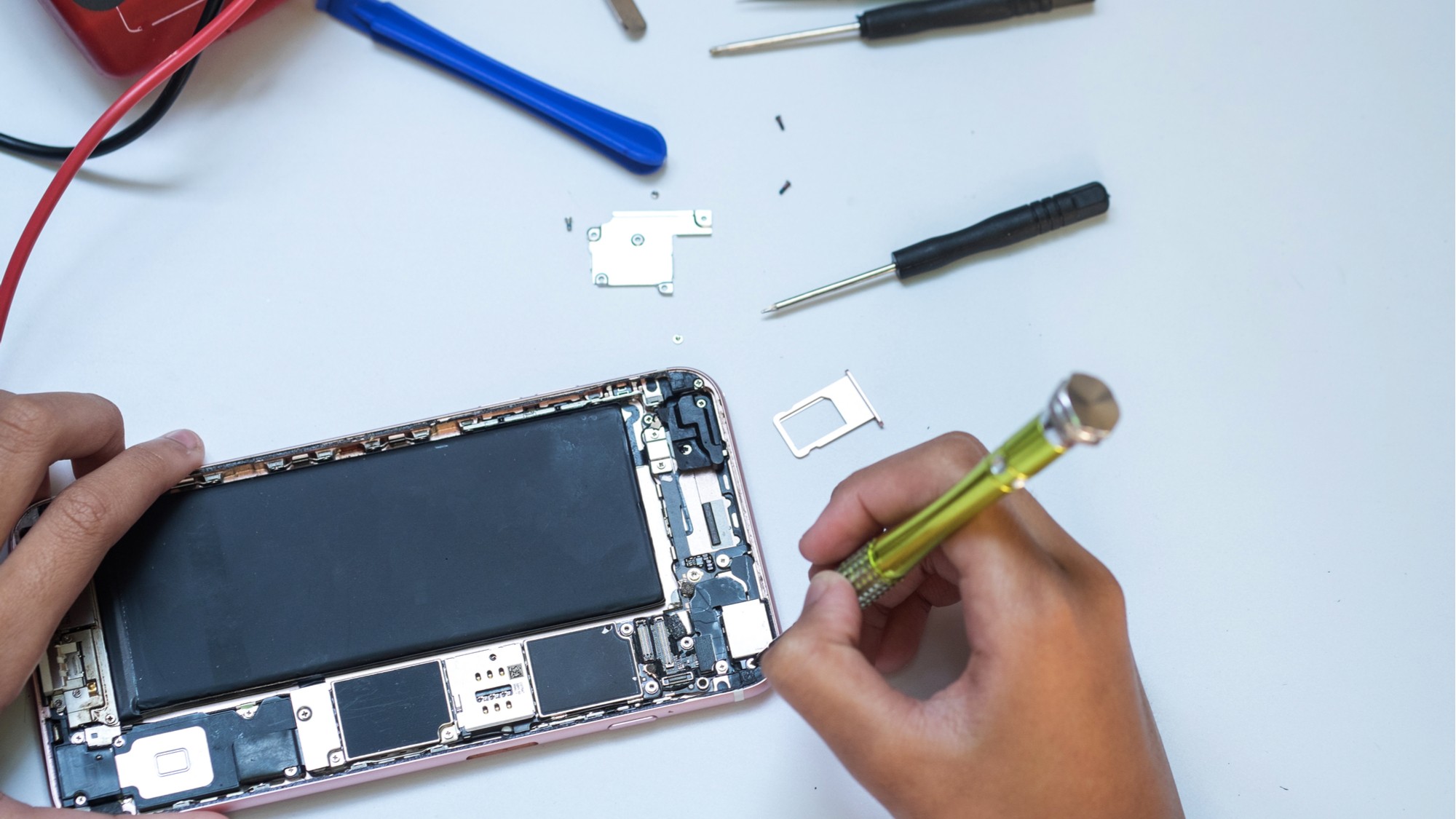Kunstkamera: a craftsman from Massachusetts is seeking independent repair rights Tesla

Here from such remains of electric vehicles the handyman collects the whole. He would like to open an unofficial Tesla repair center, but he is afraid that the company will not allow him to do this
The right to repair is what the community of specialists in electronics, cars, and agricultural machinery is seeking. The fact is that large companies that produce various systems, devices and mechanisms prohibit their repair in the event of a breakdown. Naturally, all this is overwhelmed with the words about caring for the customers themselves - they say, only a qualified specialist can repair everything so that then it would not be excruciatingly painful.
In fact, there is a far non-zero probability (say,
So, in 2016, journalists were able to obtain documentary evidence that Apple pays cash awards to officials who oppose the bills on the “right to repair”. These bills tried to hold in four states of the USA at once - Minnesota, Nebraska, New York and Massachusetts. They proposed to oblige manufacturers of electronics, vehicles, etc. provide independent repair shops and individuals with software and hardware tools required to perform repairs, which are used by the manufacturer.
')
This applies not only to Apple. Many other companies are doing worse. If the corporation from Cupertino at least does not interfere with the unofficial repair of its devices (albeit with the help of secondary market details), then such a company as John Deere directly prohibits independently servicing its tractors. And if the tractor of this company breaks down, then a farmer from a remote region has to wait for a service man from the nearest service center, leaving everything behind. The work is worth it, and the specialist can come, sometimes, only in a couple of days. And worst of all, the breakdown may be very minor - for example, something happened to the tractor software.
Tesla is also against
In the sense that Tesla Inc. also against the right to repair their electric vehicles. There seems to be no direct prohibitions, but it’s difficult to do something with your own hands due to the lack of details.
But even if the parts are in stock, the repair specialist (unofficial) is still forbidden to do something. An example is a YouTube user with the nickname Rich Rebuilds. He calls himself "Tesla Frankenstein". The fact is that he studies the insides of failed electric vehicles (drowned people, victims of fires and traffic accidents) and tries to collect one live electric vehicle from several "corpses".
He collects parts from Tesla, which can not be repaired in order to use them to restore electric vehicles that are not hopeless. "Dr. Frankenstein" is actually called Rich Benoit.
It all started with the fact that he himself wanted to buy Tesla. But the price of $ 80,000 seemed overvalued to Rich. And he began to look for an opportunity to save money, doing research in the network. Once he caught the eye of an attractive price tag, but for Tesla, who had been in the water. "Drowned", even among ordinary cars are considered almost unsuitable for use, but here it was a high-tech device with a huge number of electronic components. “I thought how difficult it can be to restore this electric car?” Maybe throw it in a bag of rice? ”- Rich jokes.
Finally, he acquired several failed electric vehicles, and began to assemble a living machine from two "corpses". Rich put all his actions on YouTube so that other users of the network could see what can and cannot be done with Tesla.
He himself is not a master of automotive affairs, but an IT specialist who has a good job in Boston. When he found out about Tesla, he immediately liked electric cars. But after a while, he realized that the company does not welcome attempts to engage in DIY-service at all. For example, Tesla did not allow its ex-employee to open a parts store and repair electric vehicles in Denmark. True, at the moment he already has a formal contract with the company.
At the moment, Rich has already restored his first Tesla (without any service centers) and is engaged in putting the second electric car in order. His work attracted the attention of the Tesla community. He also opened a Facebook group for those who want to buy or sell a spare part from a Tesla electric car. A whole community of Tesla-mobile lovers has been formed, which require the granting of the right to repair. Enthusiasts join the group from anywhere - from Norway to South Africa.

According to Rich, he now dreams of opening an unofficial Tesla electric car service center, but he is afraid of legal consequences. “I would like to do this, but I know how it all ended for those who tried to open such centers. They closed several months after opening. And Tesla did not give them the necessary tools to work, ”says Rich.
Representatives of the company at the moment do not give comments on the current situation. But there are still unofficial responses. And they are strikingly similar to those that were spoken about at third-party service centers at Apple. It is about “the need for professional repair, by specialists who know what to do in order to prevent further problems with the operation of a vehicle that goes onto public roads”. In principle, there is some truth in this - a car is not a telephone, if it breaks right on the road, this may entail not only an accident with property damage, but also cause the death of road accident participants.
On the other hand, cars of almost all other brands are repaired without any problems in third-party centers, including “garages”, which are so popular in their native country. And no one talks about the danger of repair work performed by non-specialists.
There is still hope
The right to repair is being talked louder, and officials with politicians listen to these voices, at least in the United States. Thus, the US State Senate decided to launch a “deep study” of the very concept of the right to repair.
The ruling was announced on July 25th. A special committee will be created in the state, which will study all the nuances of the right to repair, considering the point of view of both those who wish to repair something on their own and those who do not want to allow such “liberties”.
In case of confirmation of the rightness of supporters of the right to repair in Massachusetts (and then, I suppose, in other states), the official manufacturers will be obliged to provide the unofficial service centers with the tools and software to perform the necessary work. It's not just Apple or John Deere, but also other companies, including Tesla. Companies will have to provide diagnostic software, access to services, updates and patches required by third-party repairmen.

It may well be that the community of supporters of repairing do-it-yourself will defend their rights, and then Apple and other manufacturers will have to share everything and everyone with third-party companies. Of course, for the money, no one talks about free help.
By the way, it was in Massachusetts that the movement of supporters of the right to repair began. Separate voices in defense of this concept were heard long ago, but in 2012 a whole community was formed, which began to fight for their rights. There are certain positive developments - for example, car manufacturers are obliged to share information about the maintenance of their cars with informal centers.
The commission referred to above includes 23 people. It includes lawmakers, repair technicians, lawyers and representatives from many other fields.
In 2015, representatives of the camp of supporters of the right to repair won with the help of copyright specialists, who worked absolutely free. The Electronic Frontier Foundation, Public Knowledge, the Institute of Intellectual Property of Southern California and many others participated in this process. Efforts succeeded - the US Copyright Office approved more exceptions in 2015 than ever before. One of the exceptions was the repair of tractors.
The reservations related to the identity of the person who has the rights to repair, and these rights were granted only to the owner of the tractors. No one else is allowed to do servicing, maintenance or repair. Well, not all farmers are specialists in tractors. Yes, they can work with them, but modern systems are very complex, and not everyone can do something with software or hardware.
As for Tesla, it is not yet clear whether the company can prevent non-specialists from repairing their electric vehicles, or whether it should provide such craftsmen as Rich with all the necessary tools and consultancy support. In principle, it would be logical to help customers of their systems, or at least those who are a fan of this product. But, unfortunately, the logic and actions of right holders / manufacturers often diverge in diametrically opposite directions.
I would like to hope that Massachusetts will be able to achieve their own - and other regions and countries will follow this state.
Source: https://habr.com/ru/post/418531/
All Articles